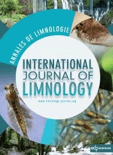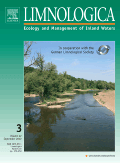
JOURNAL OF AQUATIC PLANT MANAGEMENT
metrics 2024
Bridging the gap between research and real-world application.
Introduction
JOURNAL OF AQUATIC PLANT MANAGEMENT is a key scholarly publication focusing on the management and ecological aspects of aquatic plant species. Published by the Aquatic Plant Management Society, Inc, this journal serves as an essential resource for researchers, practitioners, and policymakers involved in aquatic ecology, environmental science, and plant management. Although it does not offer open access, it remains influential in its peer-reviewed contributions to the field. Covering a broad spectrum of topics related to the management of aquatic plants, the journal has established its presence in significant academic databases and is well-regarded in areas such as Agricultural and Biological Sciences and Environmental Science. Despite facing challenges reflected in its Scopus rankings, which position it within the lower percentiles for various categories, the journal continues to strive towards enhancing our understanding of aquatic systems and the interplay of plant species therein. With its inception dating back to 1979, the journal underscores the long-term commitment to advancing knowledge in aquatic plant management.
Metrics 2024
 -
- 1.20
1.20 0.90
0.90 -
-Metrics History
Rank 2024
Scopus
IF (Web Of Science)
JCI (Web Of Science)
Quartile History
Similar Journals

ANNALES DE LIMNOLOGIE-INTERNATIONAL JOURNAL OF LIMNOLOGY
Pioneering Research in LimnologyANNALES DE LIMNOLOGIE-INTERNATIONAL JOURNAL OF LIMNOLOGY is a distinguished scientific journal dedicated to the field of limnology, focusing on freshwater ecosystems and their ecological dynamics. Published by EDP SCIENCES S A, this journal has been a vital resource for researchers and professionals since 1965, fostering a deep understanding of aquatic environments through quality research and scholarly discussions. The journal was indexed in Scopus, where it ranked in the 37th percentile within the Agricultural and Biological Sciences category, emphasizing its contribution to aquatic science. While its coverage has been discontinued in Scopus since 2021, the journal continues to engage its readership with critical insights and reviews in limnology. ANNALES DE LIMNOLOGIE promotes open access to facilitate the dissemination of valuable knowledge, making it an essential platform for students, researchers, and professionals who strive to advance our understanding of freshwater systems.

REVISTA DE BIOLOGIA MARINA Y OCEANOGRAFIA
Empowering Marine Science Through ResearchREVISTA DE BIOLOGIA MARINA Y OCEANOGRAFIA is a prominent academic journal dedicated to the fields of marine biology and oceanography, published by the Faculty of Marine Sciences and Natural Resources at Universidad de Valparaíso, Chile. Since its inception in 1996, this journal has been a vital platform for disseminating research findings and advancements in aquatic sciences, covering a breadth of topics relevant to the marine environment. With its current impact positioned within the Q4 quartile of both Aquatic Science and Oceanography categories in 2023, the journal serves as an essential resource for scholars, practitioners, and students alike, aiming to enhance their understanding of marine ecosystems. While the journal does not provide open access options, it continues to contribute valuable insights, helping to foster a deeper appreciation for oceanographic science and marine biodiversity. Located in the scenic city of Viña del Mar, Chile, this publication invites manuscripts that push the boundaries of knowledge and stimulate discourse within the marine sciences community, thereby promoting sustainable management and conservation of oceanic resources.

GULF AND CARIBBEAN RESEARCH
Exploring the Depths of Aquatic ScienceGulf and Caribbean Research is an esteemed academic journal published by the University of Southern Mississippi, dedicated to advancing the understanding of aquatic ecosystems in the Gulf of Mexico and the Caribbean region. With an ISSN of 1528-0470 and an E-ISSN of 2572-1410, the journal serves as an essential platform for researchers and professionals in the fields of Aquatic Science, Oceanography, and Water Science and Technology, recognized in the 2023 Q3 Quartile rankings across these disciplines. The journal welcomes diverse contributions including original research, reviews, and technical notes, encouraging interdisciplinary approaches to address ecological and environmental challenges within its scope. Despite the absence of an open access option, it provides invaluable insights, evidenced by its Scopus rankings, which position it within the 31st to 33rd percentile across various related categories. The engaging research articulated in Gulf and Caribbean Research fosters dialogue and collaboration, making it a vital resource for those committed to scientific discovery and conservation efforts in these critical aquatic environments.

OCEANOLOGICAL AND HYDROBIOLOGICAL STUDIES
Innovating research for sustainable aquatic futures.OCEANOLOGICAL AND HYDROBIOLOGICAL STUDIES, published by WALTER DE GRUYTER GMBH, serves as a crucial platform for the dissemination and discussion of pivotal research in the field of oceanography and hydrobiology. With an ISSN of 1730-413X and an E-ISSN of 1897-3191, this journal highlights interdisciplinary studies that address pressing ecological issues impacting marine environments. Although it currently ranks in the Q4 category of oceanography journals and holds a Scopus rank of 96 out of 145, its commitment to publishing high-quality research positions it as a valuable resource for researchers, professionals, and students alike. As it converges into 2024, OCEANOLOGICAL AND HYDROBIOLOGICAL STUDIES remains dedicated to advancing our understanding of aquatic systems, contributing significantly to the scientific community's efforts in ocean conservation and management.

SU URUNLERI DERGISI
Connecting Researchers to Elevate Aquatic SciencesSU URUNLERI DERGISI, published by EGE UNIVERSITY, FACULTY OF FISHERIES, is a premier open-access journal dedicated to advancements in aquatic sciences and fisheries research. With the ISSN 1300-1590 and E-ISSN 2148-3140, this journal has been committed to disseminating high-quality research since 1984, offering valuable insights into the management and conservation of aquatic resources. Based in BORNOVA-IZMIR, Turkey, the journal serves as a crucial platform for researchers, professionals, and students who are actively engaged in the study of fishery practices, aquaculture, and related environmental challenges. As a resource for innovative and impactful studies, SU URUNLERI DERGISI encourages submissions that foster collaboration and advancement within the aquatic research community.

LIMNOLOGICA
Pioneering Studies in Aquatic Ecosystem HealthLIMNOLOGICA is a prestigious academic journal dedicated to the field of aquatic sciences, published by Elsevier GmbH, a leading global publisher known for its commitment to disseminating high-quality research. With an ISSN of 0075-9511 and an E-ISSN of 1873-5851, the journal has established itself as a vital source of scholarly articles, reviews, and case studies since its inception in 1974. Operating from its base in Munich, Germany, LIMNOLOGICA provides a forum for researchers and professionals to explore contemporary issues in limnology, ensuring important contributions to the understanding of freshwater ecosystems. Recognized in the 2023 rankings, the journal boasts a respectable Q2 quartile in Aquatic Science, ranking #98 out of 247 in Scopus, placing it in the 60th percentile among its peers. While currently not an open-access journal, it continues to attract a wide readership by providing insights into ecological processes, conservation strategies, and the impacts of anthropogenic changes on freshwater environments. This makes LIMNOLOGICA an essential resource for anyone engaged in aquatic research, conservation efforts, and environmental policy development.

Inland Water Biology
Innovating Insights into Freshwater BiologyInland Water Biology is a distinguished peer-reviewed journal published by MAIK NAUKA/INTERPERIODICA/SPRINGER, focusing on the intricate interactions within freshwater ecosystems. With its ISSN (1995-0829) and E-ISSN (1995-0837), this journal has established itself as an essential resource for researchers and professionals in the fields of Aquatic Science and Ecology, evidenced by its consistent ranking in the Q3 category for both disciplines in 2023. Covering a wide array of topics related to the biology of inland waters, the journal aims to disseminate cutting-edge research findings and theoretical advancements that contribute to the understanding of aquatic environments and their ecological significance. Although it does not offer open access, its impact in the academic community is noteworthy, ensuring that published works undergo rigorous peer review. Researchers, professionals, and students alike will find valuable insights and innovative approaches within its pages, making Inland Water Biology a vital addition to their academic endeavors.

INTERNATIONAL REVIEW OF HYDROBIOLOGY
Innovating Research for Sustainable Aquatic SystemsINTERNATIONAL REVIEW OF HYDROBIOLOGY is a prestigious academic journal dedicated to the dynamic fields of Aquatic Science and Ecology, Evolution, Behavior, and Systematics. Published by a reputable German publisher, this open-access journal ensures that groundbreaking research is readily available to a global audience, fostering collaboration and innovation within the scientific community. With an impressive impact factor and classification within the Q2 category of both Aquatic Science and Ecology, it ranks notably high on Scopus, standing at 211 out of 721 in Ecology and 84 out of 247 in Aquatic Science as of 2023. Covering a broad scope from fundamental hydrobiological research to applied ecological studies, the journal plays a crucial role in advancing knowledge and addressing contemporary environmental challenges. Researchers, professionals, and students will find INTERNATIONAL REVIEW OF HYDROBIOLOGY to be an essential resource for informing their own work and contributing to the global dialogue on aquatic systems and their conservation.

ACTA ZOOLOGICA BULGARICA
Fostering Knowledge in the Heart of Animal SciencesACTA ZOOLOGICA BULGARICA is a prominent academic journal dedicated to advancing knowledge in the fields of Animal Science, Zoology, Aquatic Science, Ecology, Evolution, Behavior, and Systematics. Published by the Institute of Zoology, Bulgarian Academy of Sciences, this journal serves as an invaluable platform for researchers, professionals, and students to disseminate their findings and engage with contemporary issues in biodiversity and ecology. With an established history since its convergence in 2010 and an ongoing publication schedule through to 2024, the journal holds a Q4 category ranking in multiple disciplines, highlighting its role in fostering scholarly communication in these areas despite its recent entry into Scopus-indexed rankings. Although currently not an open-access journal, ACTA ZOOLOGICA BULGARICA remains a key resource for those interested in the latest research and developments, particularly within the ecological and zoological landscapes of Europe and beyond.

Freshwater Crayfish
Pioneering Research in Freshwater EcosystemsFreshwater Crayfish, published by the International Association of Astacology, is a peer-reviewed journal dedicated to the comprehensive study of freshwater crayfish, encompassing their ecology, behavior, conservation, and management. With an ISSN of 2076-4324 and an E-ISSN of 2076-4332, this journal serves as an essential platform for researchers, professionals, and students in aquatic science, particularly within the fields of Ecology, Evolution, Behavior and Systematics and Aquatic Science, where it ranks notably in Scopus rankings. The journal has a consistent publication history since 2008, enhancing its relevance and contribution to the scientific community. While it operates under an open-access model, allowing for wide dissemination of research findings, it is particularly noted for its significant impact on advancing knowledge in the preservation and sustainable management of crayfish species. This makes Freshwater Crayfish a vital resource for those passionate about aquatic biodiversity and conservation.